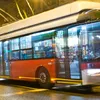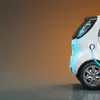This EU-funded project is pushing auto drivers to switch to clean mobility in Bengaluru
The Namma Auto Project is promoting sustainable last-mile connectivity in urban spaces by facilitating loans for auto drivers to move to electric vehicles.
Vasudeva K has been driving an auto in Bengaluru for the last 53 years. He spends his day steering through congested streets and traffic gridlocks. However, the aspect that differentiates Vasudeva’s trip from the others is that his vehicle does not leave behind any trail of smoke. The 53-year-old was among the first drivers in the city to have retro-fitted his auto with an electric kit.
This was made possible by the Namma Auto Project, an initiative by a consortium of institutions such as Fondazione ACRA, ENVIU Foundation, The Energy and Resources Institute (TERI), and Women Health and Development (WHAD). Working under the Switch Asia Project and funded by the European Union, the programme is focussed on integrating eco-friendly electric rickshaws in mass transit and promoting sustainable mobility.
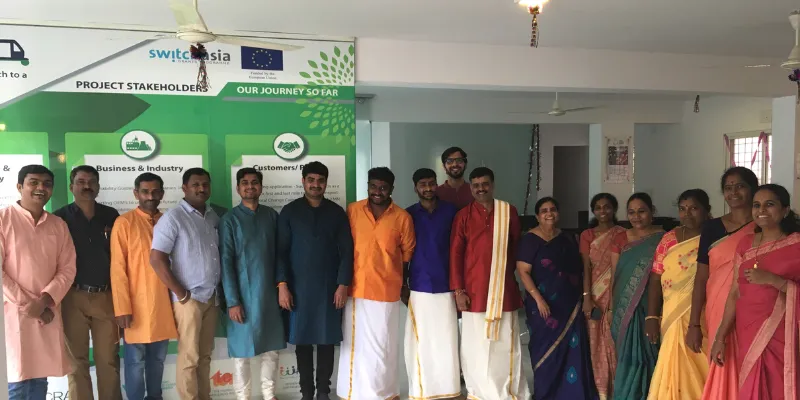
The team of Namma Auto Project.
Launched in 2015, the project is presently being implemented in Bengaluru and Chennai by helping rickshaw drivers switch to electric vehicles. Its 40-member team has been following a four-fold strategy to bring about this change.
“Auto-rickshaws cater to at least 10 percent of on-road mobility in urban areas. The emissions they spew out contribute to a major chunk of ambient pollution. So, we are dishing out a cleaner last-mile alternative to this by facilitating loans for drivers to move to electric vehicles, holding awareness as well as behavioural change events for the public at large and also bridge policy-level gaps in the sector together with the government,” Manju Menon, Project Head, Namma Auto tells SocialStory.
In the last four years, the project has been able to reach over 30,000 auto drivers to enable them to buy eco-friendly rickshaws by facilitating low-interest loans. It has also enrolled around 1,100 of them in various insurance schemes.
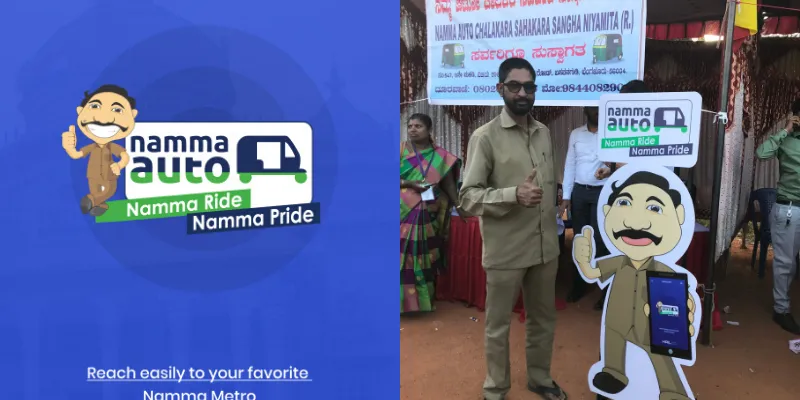
The Namma Auto Project has reached out to thousands of auto drivers so far.
The inception phase
The roots of the Namma Auto Project emerged from a Netherlands-based social enterprise named Enviu.
As an independent entity, all of Enviu’s efforts were centred around building organisations, which could create an impact on the social or environmental sector. Three Wheels United was one of them. Established in 2014, the company developed a model to finance electric auto-rickshaws in India, only to realise that it needed an effort from multiple stakeholders. That was when Enviu’s Three Wheels United approached organisations like WHAD, ACRA, and TERI to join in and form a consortium. The Namma Auto Project was formed as a result of this.
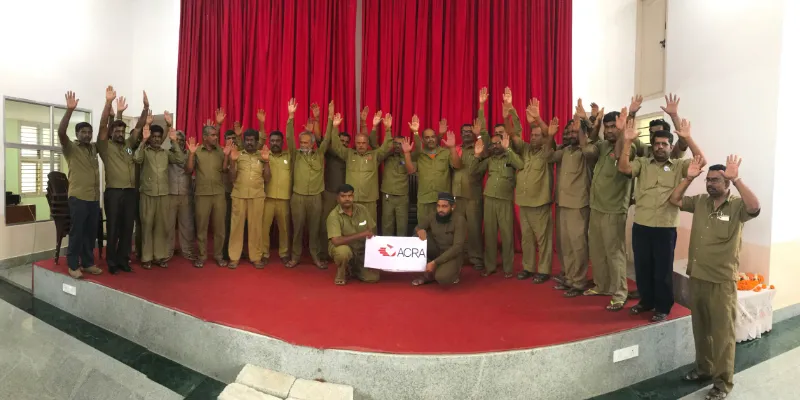
Auto drivers holding up the banner of ACRA.
“The Namma Auto Project was started to strengthen the mission of Three Wheels United, which was to help drivers to switch to cleaner auto-rickshaws. We are all geared up for the next phase now,” says Cedrick Tandong Neba, CEO and Enviu Representative, Three Wheels United.
Since the overall motto was found to be in line with the Sustainable Development Goal (SDG) 12 of responsible production and consumption, the EU extended its support in the form of a grant amounting to 1.5 million Euros as part of its Switch Asia Programme.
Enabling a smooth transition to electric rickshaws
The Namma Auto Project kicked off with efforts to bring about a sense of awareness among auto drivers about the significance and benefits of switching over to electric vehicles.
“We spoke to thousands of drivers as part of this and realised that most of them were ready to shift to the electric mode, but did not have access to the required finance or capital. So, we systematically began identifying all these drivers through community development programmes to facilitate loans for them to transition to electric autos,” notes Manju.
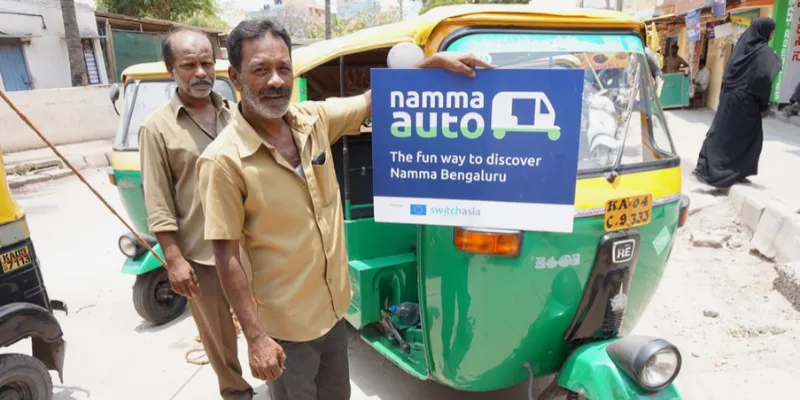
The project facilitates loans for auto drivers to shift to electric vehicles.
Many of the nationalised banks today are hesitant to disburse loans to drivers either due to their disconnect from the banking circuit or due to low CIBIL ratings. The Namma Auto Project team is tackling this by partnering with banks such as Canara Bank, Kanakadurga Finance, Corporation Bank, and non-banking financial companies (NBFCs) to assure them of repayment on behalf of the auto drivers.
“Since most of the driver communities come from marginalised backgrounds and earn money on a day-to-day basis, we have designed short loan repayment schedules for them. For example, instead of paying Rs 5,000 at the end of every month, they are asked to settle Rs 1,250 every week or Rs 166 every day. Besides, the interest rates on these loans are as low as 18 percent, and we are trying to bring this down further,” says Manju.
The purchase of electric autos and the documentation work involved in the transaction are under the purview of the project. The consortium’s tie-ups with original equipment manufacturers (OEMs) like Bajaj, TVS, and Mahindra tends to ease this process.
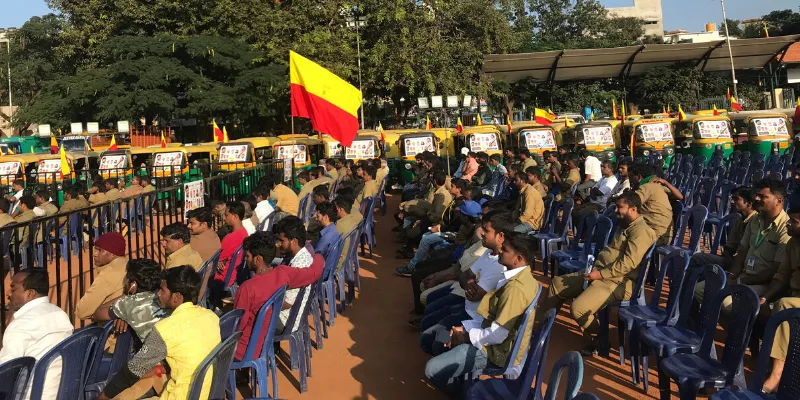
An event held by a auto drivers co-operative society in Bengaluru.
Besides these, the Namma Auto Project is involved in a slew of other activities such as conducting training sessions for drivers to operate electric vehicles, bridging policy-level gaps in the electric vehicle space by engaging with NGO’s, academicians, government officials, auto unions, and also forming state-level co-operative societies of auto drivers like the Namma Auto Chalakara Sahakara Society.
To promote sustainable last-mile transport, the consortium leading the project has launched an e-rickshaw ride-booking app called Hail Mobility in Bengaluru. The app, currently in its pilot stage, is meant for people who use metro services regularly. It is designed to enable them to book autos and from the stations connecting office or residents according to pre-fixed routes and rates.
Building a path to reduce carbon emissions
The Namma Auto Project has so far helped more than 1,500 auto drivers gain access to capital and shift to cleaner autos. Vasudeva is one of them.
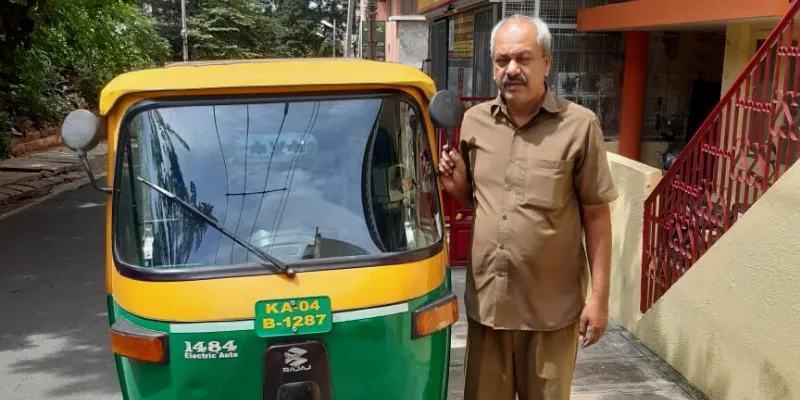
The 53-year old auto driver, Vasudeva.
“After encountering frequent repairs in my old auto and realising the importance of clean transport, I decided to convert my vehicle into an electric one about two years ago. I was able to do this only after getting Rs 1.5 lakh loan through the Namma Auto Project. Banks would not have granted me the required capital, considering my poor financial background,” he recollects.
The Namma Auto Project also conducted a three-year in-depth study specific to Bengaluru and found that making strategic and eco-friendly changes to auto-rickshaws was capable of easing traffic woes and reducing air pollution.
“One of the key findings was that turning the city’s two lakh rickshaws into electric ones would lead to the elimination of 7.4 lakh tonnes of carbon dioxide (CO2) emissions. The positive impact of this on the environment is likely to be immense. Our project is keen on achieving this by switching the narrative to sustainable mobility,” says Manju.
(Edited by Megha Reddy)



